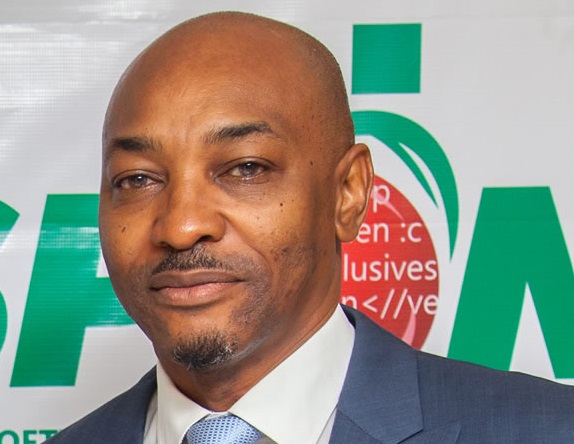Telecom
Mba-Uzoukwu, ISPON President Decries 30% Utilisation Rate of 11 Datacenters in Nigeria

Mr. Chinenye Mba-Uzoukwu, president, Institute of Software Practitioners Association of Nigeria (ISPON) has decried the under utilisation of the 11 data centres in Nigeria, putting the current utilisation rate at below 30%.

He noted that the low adoption indicated that despite the forecasted growth in installed capacity, the patronage by way of utilisation does not match the expected levels.
He made this known while speaking at a Technology Forum organized by the Nigerian Information Technology Reporters Association (NITRA) in Lagos, with the theme: “Achieving 30% Growth In Local Cloud Hosting By 2024”.
According to Mba-Uzoukwu, “we are faced with a puzzling question: the housing estates that our friends are building against all odds in a super-challenging environment, will they be occupied by offshore tenants or ourselves?”
“There are 11 datacenters in Nigeria and the largest are expanding their capacity constantly in anticipation of a growing demand but currently the utilisation of capacity probably sits at below 30%.
“With four certified Tier 3 Constructed Facilities in Nigeria and more on the way, the Africa datacenter market is expected to cross $3bn by 2025, growing at a CAGR over 12%.
“This indicates that despite the forecasted growth in installed capacity, the patronage by way of utilisation does not match the expected levels”.
Unformed report also indicates that Galaxy Backbone Limited which is the only Uptime Institute Certified Tier 3 Datacenter in the public sector (in Nigeria) is currently estimated at 38% capacity utilisation of its 2.5MW capacity.
To this end, the President of ISPON said, “We must ask why”.
“The 2020 GSMA report highlights that availability of internet services has not translated to adoption while there is no established correlation between broadband availability and indicators of innovation such as hubs and software companies e.g. Aba, Enugu, Calabar, Benin and Jos have limited broadband and predominantly 2.5G/3G networks yet host significant innovation activity.
“ISPON’s research indicates that this puzzling scenario is directly related to local software – local in the sense of being developed by Nigerians for Nigerians to solve Nigerian problems.
“While we have seen phenomenal growth in the fintech space, the vector and velocity for the evolution of Software Nigeria as a whole remains constrained by the extent to which the Digital Economy which is emerging is anchored on local innovation and local utilisation.
“The datacenters performance is driven by users are large corporates and MNCs for whom data services are not taken lightly as they commit to long-term relationships on the basis of reliability especially High Availability which is indexed to global standards. In this context, Digital Transformation, especially in the public sector is critical pre-requisite.
“Digital Transformation delivers joined-up government that enables the policy and process of governance to ride on top of IT infrastructure from broadband to software solution stacks. It also presents opportunities for entrepreneurship and innovation to flourish as solution providers get work to do. For this dynamic to be accelerated and proliferated, it is difficult to over-estimate or emphasise the importance of the Local Cloud which must be the initial point of access for a broad-based digital adoption and transformation strategy in a rising tide that lifts all.
“We often fail to recognise and prioritize this fundamental – perhaps it is an inconvenient truth?
“There is much to unpack in this but it will suffice to say that ISPON believes that the Software Nigeria and Data Nigeria are conjoined twins – separating the two is not only difficult but in this case, it is foolhardy because what we share is vital to the survival of each twin. Let us therefore proceed with this in mind!”
He also applauded NITRA for hosting the event, adding that ISPON sees the Association as an integral component of the technology ecosystem as partners as well as practitioners whose largely unsung efforts have been pivotal to the emergence of the industry we celebrate today as Africa’s most vibrant and fastest evolving technology ecosystem.
“ISPON celebrates you, one and all!
“We are therefore extremely pleased to be a part of this celebration and the discussions that follow will be one more block laid by NITRA in the tremendous role being played by your Association and members in the growth of the Digital Economy.
“We thank you for what you do and once again, give our assurances of a continued partnership.
Chike Onwuegbuchi, Chairman of Nigeria Information Technology Reporters’ Association (NITRA), said that the theme was carefully selected to enable stakeholders in the information and Communications Technology to discuss issues that will bring growth and development to the sector.
“This edition”, he said, “we are looking at local cloud hosting a very important aspect of technological development.
“Cloud computing has been described as the greatest game changer since the creation of the internet and is one of the fastest growing areas of technology today. It can be simply defined as renting time on a computing infrastructure over the internet, rather than building your own from the ground up. In a way, it could be described as outsourcing your computer infrastructure.
“Cloud computing offers scalability and reliability that cannot be matched by a single enterprise.
“Today, we are talking of data protection. How can you protect data that is warehoused outside of our shores?
“Local cloud hosting also helps to keep our local internet traffic local as local content providers host their content in-country.
He also recalled that NITDA in 2019 launched Nigeria’s Cloud computing policy and one of the goals of this Policy is to ensure a 30% increase in adoption of cloud computing by 2024 among Federal Public Institutions (FPIs) and SMEs that provide digital-enabled services to the government.
“The policy also targets 35% growth in cloud computing investments by 2024. It is on this that we selected the theme of today’s event.
“When we are talking about local cloud hosting we can’t achieve it if we don’t patronize local datacenters; this informed the presences of datacentre operators in this discourse.
The Forum attracted industry stakeholders including corporate organisations; Nigeria Internet Registration Association (NiRA); Internet Exchange Point of Nigeria (IXPN); Cloudflex; Layer3; Vintage Confluence LLC and industry associations – ISPON, ALTON, ATCON, NCS, amongst others.
Telecom
Mafab Communications Has Launched 5G Services- Findings

Contrary to media some media reports yesterday, Mafab Communications, one of the companies granted Fifth Generation (5G) licences by Nigerian Communications Commission (NCC) has actually rolled out its 5G network services in Abuja since 2023.

According to Nigeria CommunicationsWeek findings, the rollout came almost a year since the telco paid $273.6 million for spectrum in the 3.5GHz band as part of a government auction.
Mafab Communications, has, not however kept to its promise to to strengthen its commercial operations by March 2025 as its services has remained skeletal since the media launch.
It said that it will roll out its high-speed 5G services through 102 operational sites strategically located in Kano and Abuja but that did not happen as at close of March.
An insider in the company, however assured that starting this month, subscribers with Mafab’s 5G routers will be able to enjoy ultra-fast connectivity on its expanding network.
This move aims to capture a wider share of Nigeria’s growing demand for 5G services.
Dr Musbahu Bashir, founder and chairman, Mafab Communications, said during the rollout launch that the telco will offer both voice and data services nationwide.
Additionally, Nigerian cities like Lagos, Port Harcourt, Enugu, Kano, and Kaduna have been listed for the deployment of 5G services while those not on the list will have services deployed at a later stage.
“The rollout of Mafab Communications 5G network is the beginning of immense opportunities for the country as it represents Nigeria’s capabilities and infinite possibilities,” he said.
“The prospect of increased job opportunities as a consequence of the value-chain benefits the technology will generate and offer is the dream we have all gathered here to launch today,” Bashir continued.
Telecom
Samsung Introduces Local Nigerian Languages to Galaxy Devices, Celebrating Cultural Diversity

Samsung Electronics has taken a bold step in enhancing user experience and inclusivity by introducing Hausa, Igbo, and Yoruba as official language options on selected Samsung Galaxy devices.

L-R: Stephen Okwara, Head, Product Management, Mobile Experience, Samsung Electronics West Africa; Joy Tim-Ayoola, Group Head, Mobile Experience, Samsung Electronics West Africa; Tae Sun Lee, Samsung Electronics West Africa CEO; Oge Maduagwu, Head of Marketing Samsung Electronics West Africa, and Nathan Lee, Regional Business Lead, Mobile Experience, Samsung Electronics West Africa, at the launch of Nigeria local language integration on Galaxy S25, A56, A36, and A26 devices, on April 03, 2025.
The feature, which is now available on the Galaxy S25, A56, A36, and A26 devices, reaffirms Samsung’s commitment to delivering innovative technology that speaks the language of its users.
With this groundbreaking update, Samsung users across Nigeria can now navigate their smartphones in their preferred local language, making technology more accessible, while also upholding our cultural heritage.
A Celebration of Culture and Technology
To mark the launch, Samsung hosted a cultural-themed press briefing featuring traditional music, local cuisine, and a showcase of the new language feature. Employees and guests attended in traditional Yoruba, Igbo, and Hausa attires, celebrating Nigeria’s rich cultural diversity.
Samsung also announced plans to expand local language support to more devices in the near future, reinforcing its dedication to making technology more inclusive for African users.
Empowering Users Through Language
The integration of Hausa, Igbo and Yoruba on Samsung devices reflects the brand’s mission to bridge the digital gap and enhance user engagement. Speaking at the press conference, Oge Maduagwu, Head of Marketing, Samsung Electronics West Africa, said, “At Samsung, we understand that technology is most powerful when it is accessible to all.
“By incorporating our local Nigerian languages, we are making our devices more intuitive and relatable, ensuring that millions of Nigerians can interact with their smartphones in the language they love and understand best”.
Seamless Language Transition on Galaxy Devices
Stephen Okwara, Head of Product Management, Samsung Electronics West Africa added, “The new local language feature is designed to deliver a seamless user experience, allowing customers to easily switch between languages. Users can activate Hausa, Igbo, or Yoruba on the Galaxy S25, A26, A36, and A56 by navigating to: Settings > Language & Input > Select Language
“This update enhances smartphone usability, particularly for those who prefer their native language over English, ensuring greater digital inclusivity, enhancing digital literacy and encouraging more users to engage with technology in their native tongues” He concluded.
Availability
Customers can visit all Samsung Experience Stores or authorized retailers in Nigeria to learn more and experience the feature firsthand.
Telecom
Sophos Reveals Key Findings: 56% of Cyberattacks Exploit Valid Credentials

Sophos, a global leader of innovative security solutions for defeating cyberattacks, has released the 2025 Sophos Active Adversary Report, which details attacker behaviour and techniques from over 400 Managed Detection and Response (MDR) and Incident Response (IR) cases in 2024.

The report found that the primary way attackers gained initial access to networks (56% of all cases across MDR and IR) was by exploiting external remote services, which includes edge devices such as firewalls and VPNs, by leveraging valid accounts.
The combination of external remote services and valid accounts aligns with the top root causes of attacks. For the second year in row, compromised credentials were the number one root cause of attacks (41% of cases). This was followed by exploited vulnerabilities (21.79%) and brute force attacks (21.07%).
Understanding The Speed of Attacks
When analyzing MDR and IR investigations, the Sophos X-Ops team looked specifically at ransomware, data exfiltration, and data extortion cases to identify how fast attackers progressed through the stages of an attack within an organization. In those three types of cases, the median time between the start of an attack and exfiltration was only 72.98 hours (3.04 days). Furthermore, there was only a median of 2.7 hours from exfiltration to attack detection.
“Passive security is no longer enough. While prevention is essential, rapid response is critical. Organizations must actively monitor networks and act swiftly against observed telemetry. Coordinated attacks by motivated adversaries require a coordinated defense. For many organizations, that means combining business-specific knowledge with expert-led detection and response. Our report confirms that organizations with proactive monitoring detect attacks faster and experience better outcomes,” said John Shier, field CISO.
Other Key Findings from the 2025 Sophos Active Adversary Report:
· Attackers Can Take Control of a System in Just 11 Hours: The median time between attackers’ initial action and their first (often successful) attempt to breach Active Directory (AD) – arguably one of the most important assets in any Windows network – was just 11 hours. If successful, attackers can more easily take control of the organization.
· Top Ransomware Groups in Sophos Cases: Akira was the most frequently encountered ransomware group in 2024, followed by Fog and LockBit (despite a multi-government takedown of LockBit earlier in the year).
· Dwell Time is Down to Just 2 Days: Overall, dwell time – the time from the start of an attack to when it is detected – decreased from 4 days to just 2 in 2024, largely due to the addition of MDR cases to the dataset.
· Dwell Time in IR Cases: Dwell time remained stable at 4 days for ransomware attacks and 11.5 days for non-ransomware cases.
· Dwell Time in MDR Cases: In MDR investigations, dwell time was only 3 days for ransomware cases and just 1 day for non-ransomware cases, suggesting MDR teams are able to more quickly detect and respond to attacks.
Ransomware Groups Work Overnight: In 2024, 83% of ransomware binaries were dropped outside of the targets’ local business hours.
· Remote Desktop Protocol Continues to Dominate: RDP was involved in 84% of MDR/IR cases, making it the most frequently abused Microsoft tool.
To shore up their defenses, Sophos recommends that companies do the following:
· Close exposed RDP ports
· Use phishing-resistant multifactor authentication (MFA) wherever possible
· Patch vulnerable systems in a timely manner, with a particular focus on internet-facing devices and services
· Deploy EDR or MDR and ensure it is proactively monitored 24/7
· Establish a comprehensive incident response plan and test it regularly through simulations or tabletop exercises
Read the full It Takes Two: The 2025 Sophos Active Adversary Report on Sophos.com.

 Telecom3 days ago
Telecom3 days agoMTN Denies Data Theft Allegations, Says no Financial Incentive to Do So

 Telecom3 days ago
Telecom3 days agoVitel Wireless, Nigeria’s First MVNO to Launch Operations This Quarter

 Telecom2 days ago
Telecom2 days agoMafab Communications Has Launched 5G Services- Findings

 Broadcasting2 days ago
Broadcasting2 days agoBurna Boy, Other Nigerian Artists Pocket $38m from Spotify in 2024

 E-Financial3 days ago
E-Financial3 days agoFG Asks World Bank for Fresh $10.50m Loan to Enhance CBN Technical Capacity

 Telecom2 days ago
Telecom2 days agoSophos Reveals Key Findings: 56% of Cyberattacks Exploit Valid Credentials

 E-Business2 days ago
E-Business2 days agoEquinix Launches LG2.3 Data Centre in Nigeria

 E-Business2 days ago
E-Business2 days agoMicrosoft Marks 50th Anniversary with Major Copilot AI Update























